What is the first step in a skin analysis
Skin analysis is a crucial first step in any professional skincare treatment. It provides the foundation for understanding a client’s unique skin needs, allowing skincare professionals to create personalized and effective treatment plans. Through a combination of visual assessment, tactile evaluation, advanced tools, and in-depth consultations, skin analysis ensures that each treatment is tailored to address specific skin concerns.
This article explores the importance of skin analysis, outlines the key steps in the process, and highlights Milady’s approach as the essential starting point for accurate skincare evaluation.
Skin Analysis Process Overview
|
Step |
Description |
|
1. Visual Examination |
Check overall skin appearance, including tone and texture. |
|
2. Sensory Evaluation |
Assess moisture, elasticity, and skin smoothness. |
|
3. Specialized Equipment |
Use tools like UV light or scanners to evaluate deeper conditions. |
|
4. Client Concerns Discussion |
Discuss specific skin issues with the client |
|
5. Personalized Recommendations |
Offer tailored skincare advice based on analysis results. |
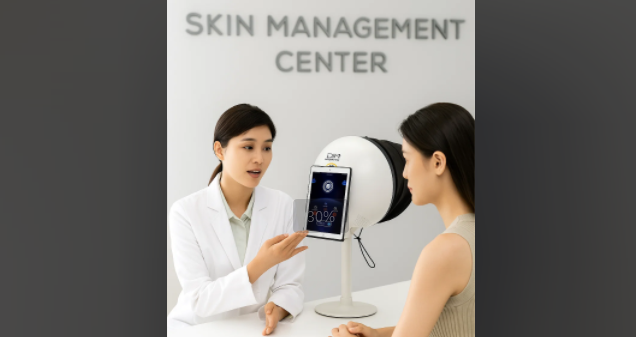
Why Skin Analysis is Important
Skin analysis is the foundation of any professional skincare treatment, allowing for the creation of a tailored, effective skincare plan. A comprehensive skin assessment enables professionals to evaluate a client’s skin type, condition, and specific concerns. Here's why it’s essential:
Medical Background:
Understanding a client’s medical history—such as past skin conditions, allergies, and medications—is crucial for identifying potential risks and ensuring safe treatment. Skin conditions like eczema, rosacea, or acne, along with medications (e.g., Accutane), can influence how the skin reacts to treatments. Knowing these factors helps adjust the approach to avoid irritation or other complications.
Identifying Skincare Concerns:
A facial skin analysis helps professionals understand the client’s primary skincare issues, whether acne, pigmentation, fine lines, or dryness. This information allows for the development of a targeted treatment plan, ensuring that the most effective products and techniques are used to address the client’s specific needs.
Allergy Awareness:
Identifying allergies is critical for selecting the right products and preventing adverse reactions. Many skincare products contain active ingredients that may irritate sensitive skin or trigger allergic responses. Knowing a client’s allergies helps professionals choose safer, more effective products that protect the skin and avoid discomfort.
Informed Decision-Making:
The facial skin analysis offers valuable insights that guide professionals in making informed decisions about the best treatment course. By understanding the client’s skin type, concerns, and medical history, professionals can select the most suitable products and techniques, ensuring a safe, effective, and personalized approach for optimal results.
Skin analysis is an essential step in any skincare treatment plan, providing the insights needed to deliver safe, personalized, and effective care. Without this crucial evaluation, treatments may be ineffective or even harmful, emphasizing the importance of this first step in delivering high-quality skincare services.
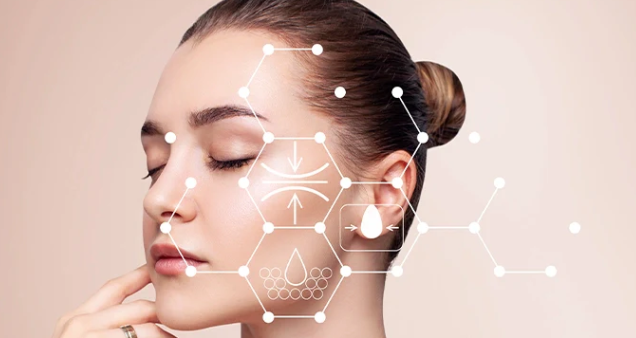
To see how much your complexion can reveal beyond aesthetics, read our article on what your skin reveals about your health.
What is the Process of Facial Skin Analysis ?
Face skin analysis is an essential step in creating personalized skincare treatments. It offers a detailed evaluation of the skin’s condition, allowing professionals to design treatments tailored to the client's unique needs. Here's an overview of the key steps involved:
Step 1: Visual Examination
The initial step is to assess the skin's appearance. Professionals examine the skin's tone, texture, and any visible signs of aging, such as wrinkles, fine lines, or pigmentation issues. This visual inspection helps identify common skin concerns like acne, rosacea, or sun damage. Observing these characteristics gives professionals a clearer understanding of the skin's overall health and highlights areas that may need attention.
Step 2: Tactile Evaluation
In this stage, the professional assesses the skin by touch, checking its texture, moisture levels, and firmness. This tactile examination helps determine whether the skin is dry, oily, or balanced, and offers insight into its elasticity. Elasticity is an important indicator of skin vitality and aging. By feeling the skin, the professional gains a deeper understanding of its condition, which is crucial for developing an effective treatment plan.
Step 3: Use of Specialized Technology
To obtain a more in-depth analysis, professionals often use advanced tools such as UV light, magnification, or digital skin scanners. These tools help reveal underlying issues not visible to the naked eye, such as hidden sun damage, dehydration, or clogged pores. They can also identify finer details, such as oil buildup or early pigmentation changes, which guide more precise treatment decisions.
Step 4: Client Discussion
Once the face skin analysis is complete, the professional engages the client in a detailed conversation to understand their specific skincare concerns. Whether it's treating acne, reducing wrinkles, addressing uneven skin tone, or improving texture, this dialogue allows the professional to personalize the treatment further. The professional may ask about the client’s skincare habits, lifestyle, and any other factors influencing their skin. This step helps create a treatment strategy that addresses the client’s needs effectively.
By integrating visual and tactile assessments, specialized technology, and a thorough discussion with the client, skin analysis provides a comprehensive understanding of skin health. This process enables professionals to develop targeted and customized treatments for optimal results.
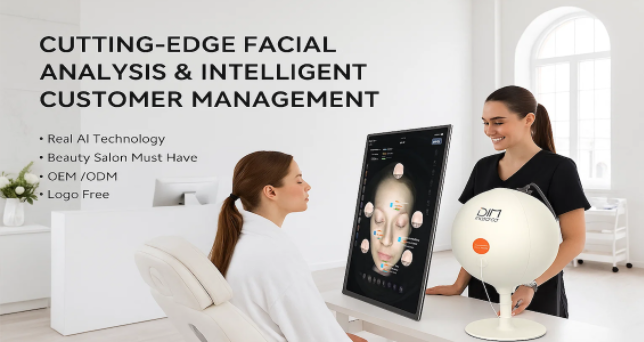
When Performing an AI Skin Analysis, the First Step is Always Milady
What is Milady’s Approach ?
Milady’s approach, as defined in the Milady Standard for Cosmetology, marks the first and most critical phase in face skin analysis. It centers on a thorough consultation that helps skincare professionals understand the client’s unique skin needs before moving on to more technical assessments. This initial step forms the foundation for crafting a personalized skincare plan.
Why Milady’s Approach Matters
Comprehensive Understanding of the Client: This method begins with an in-depth conversation to uncover the client’s skin concerns, lifestyle habits, past treatments, and any underlying health conditions. This insight provides the necessary context for tailoring the skin analysis and subsequent treatment.
Identifying Primary Skin Issues Early: Through detailed questioning, professionals can highlight the most urgent skin concerns, whether it's acne, dryness, hyperpigmentation, or other conditions. Addressing these primary issues upfront ensures that the analysis focuses on the client’s most pressing needs, which can guide the treatment process more effectively.
How Milady’s Approach Shapes Customized Skincare
Milady’s approach allows professionals to determine the skin type and key concerns from the outset. This understanding is crucial for selecting the most appropriate products and treatments, ensuring that the client's skincare routine is designed to meet their specific requirements. As a result, the client receives a tailored solution that targets their individual needs with precision.

Key Components of Milady’s Approach
Thorough Observation and Consultation: The process relies on both visual inspection and a detailed discussion with the client. This combined method helps professionals assess not only the skin's condition but also the environmental and lifestyle factors that may influence its health.
Establishing Client Trust: Building a trusting relationship is critical. Open communication allows the client to feel at ease, ensuring they share accurate information. This trust is essential for a more detailed and insightful skin analysis.
The Impact of Milady’s Approach on the Entire Analysis Process
Laying the Groundwork for Treatment Selection: The initial consultation equips professionals with vital information, enabling them to choose the most suitable treatments and products for the client’s needs, ensuring that future steps are aligned with the desired outcomes.
Addressing Chronic Skin Conditions: For clients with ongoing skin concerns, such as rosacea or eczema, this approach allows the professional to identify challenges early in the process. By doing so, they can design a treatment plan that specifically addresses and manages these long-term conditions throughout the skincare journey.
Milady’s approach is a vital first step in skin analysis, laying the foundation for personalized and effective skincare treatments. Through comprehensive consultation and observation, this method ensures that professionals can select the best strategies to meet the client’s unique skin needs, ultimately delivering optimal and targeted results.
Read more
https://www.djmimoreme.com/resources/blog/how-often-should-a-skin-analysis-be-performed.html
Conclusion
In conclusion, a thorough skin analysis is essential for delivering safe, effective, and personalized skincare treatments. By understanding a client’s skin type, concerns, and medical background, professionals can create targeted treatment strategies that yield the best results. Whether using Milady’s approach to build trust and identify primary concerns or leveraging advanced tools for deeper insights, this process ensures that every skincare journey is unique and suited to the individual’s needs. The result is optimal care, improved skin health, and more satisfied clients.
Table of Contents
Related information
How can we help you?
Have specific questions or requests? Fill out our inquiry form, and our dedicated team will get back to you promptly. Your inquiries are important to us, and we are committed to providing comprehensive and personalized responses tailored to your needs.


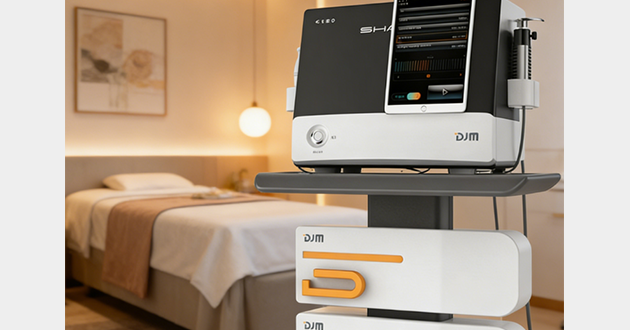
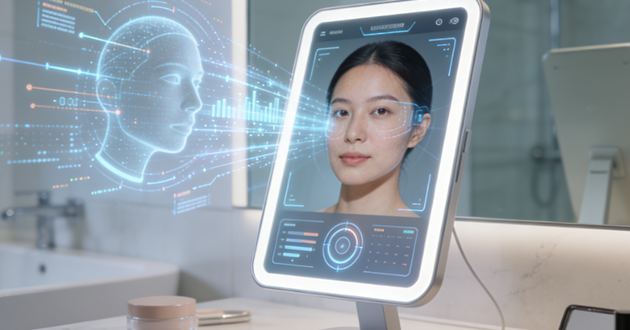







 Reach out to us today!Whether you are preparing to start your own
business in the beauty industry, are ready to upgrade your
equipment, or are just interested in our products,Contact us
today, and let’s explore how we can partner to achieve your goals
and drive your success to new heights!
Reach out to us today!Whether you are preparing to start your own
business in the beauty industry, are ready to upgrade your
equipment, or are just interested in our products,Contact us
today, and let’s explore how we can partner to achieve your goals
and drive your success to new heights!
